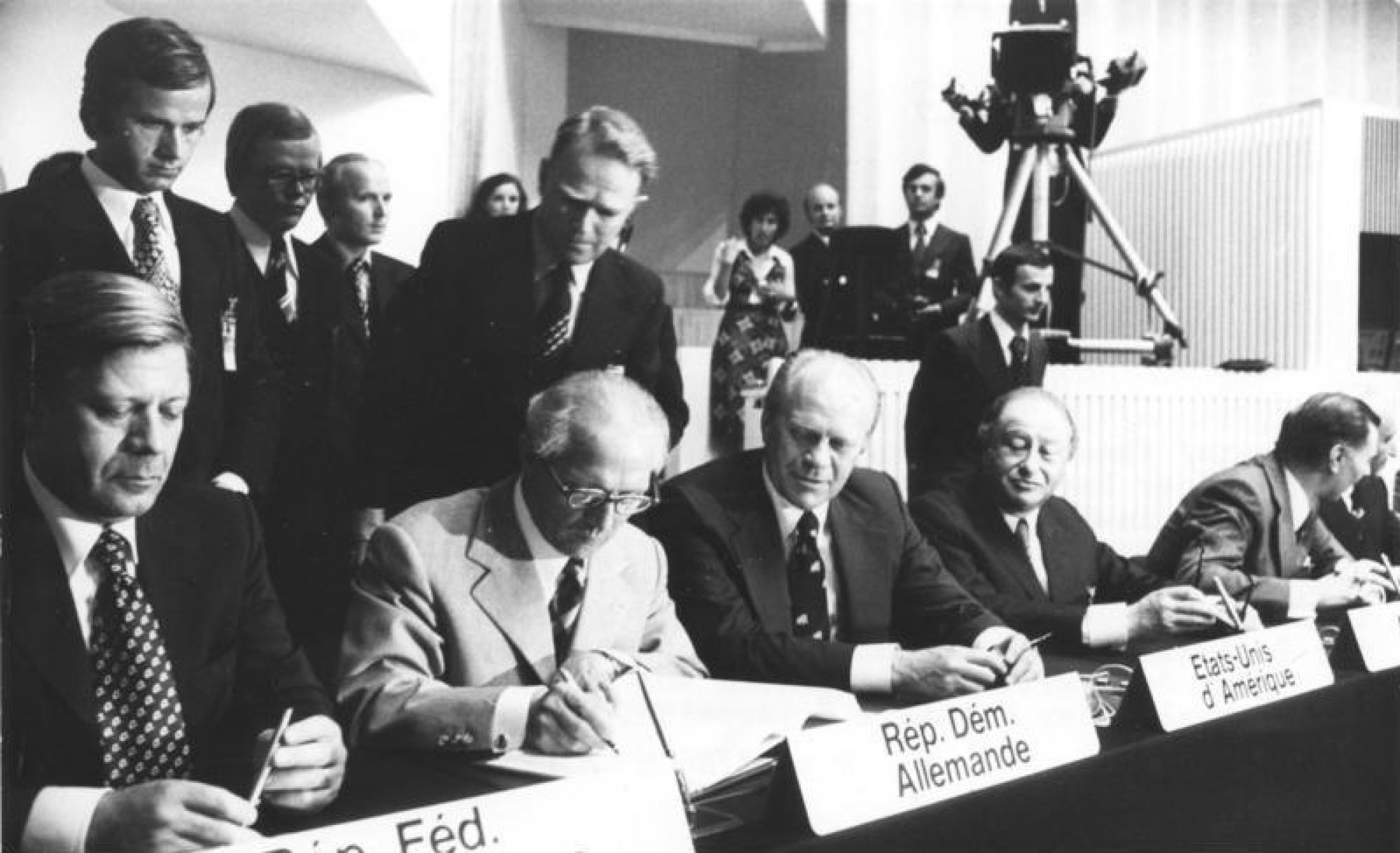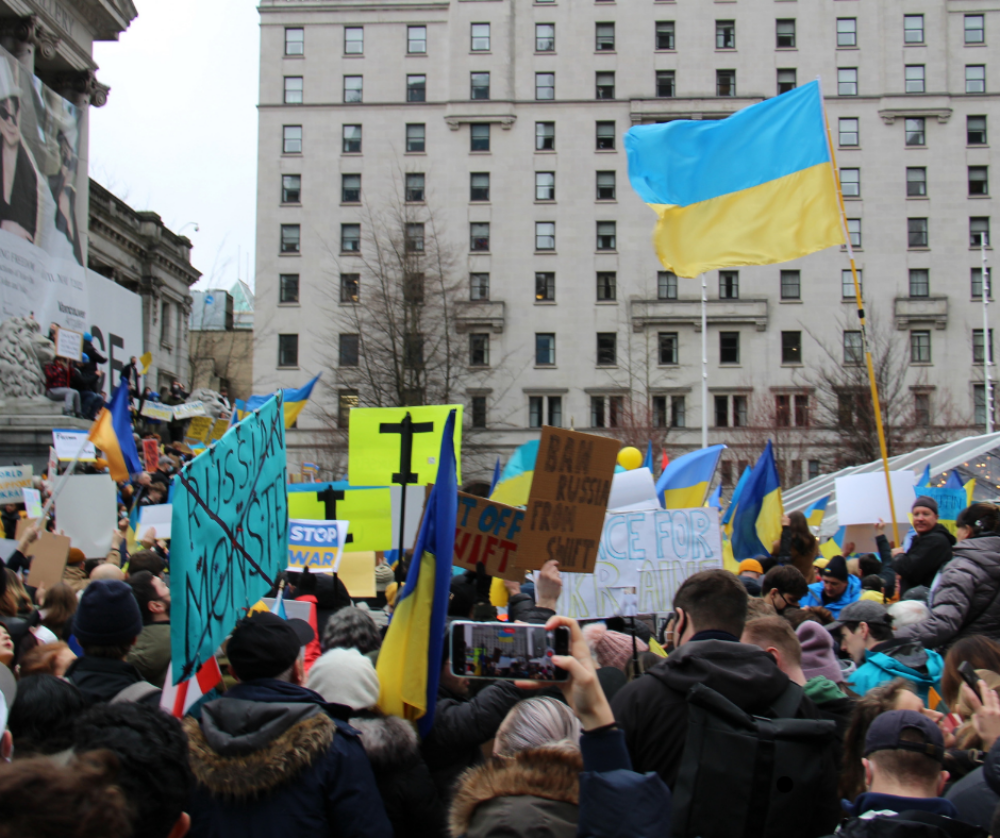Bundesarchiv, Bild 183-P0801-026 / CC-BY-SA 3.0

Why the 1975 OSCE Helsinki Final Act Still Matters
Widely considered to be the foundational document for promoting democracy, peace, security and human rights across Europe, the non-binding Helsinki Final Act — implemented by the then-Conference for Security and Co-operation in Europe (CSCE) of 1975 — remains as relevant as ever for today’s Organization for Security and Co-operation in Europe (OSCE). This milestone document, signed on August 1, 1975, served in particular to foster sovereignty and ensure territorial integrity in Europe and beyond.
To commemorate its anniversary, the Albanian 2020 OSCE Chairmanship dedicated the final Permanent Council meeting before the summer recess to call on participating States to put aside their differences and remember the importance of this document. In his remarks, Albanian Prime Minister Edi Rama, the 2020 Chair-in-Office of the 57 OSCE participating States, stressed: “As Europe is scarred by conflicts, the work of our Organization, as well as the good will of all of its participating States, is needed even more. To be meaningful and relevant, peace and democracy must not be simply our common words and horizon, but our common objectives… We should find inspiration in this anniversary, to move forward with renewed determination.”
Decades ago, the Helsinki Final Act amounted to a landmark agreement in world history by reducing tensions in Europe, uniting a divided Germany, putting an end to the Cold War and establishing trust among the participating States. These days, however, that sort of collective quest for unity seem increasingly difficult to achieve. Even though a great deal of its founding principles have been fulfilled, the act’s purpose remains incomplete due to the current challenges facing Europe. They include the ongoing violation of territorial integrity in eastern Ukraine; the occupation of the Georgian regions of South Ossetia and Abkhazia,; the protracted conflict in Moldova,; simmering hostilities between Armenia and Azerbaijan in Nagorno-Karabakh; and the increasing violation of human rights and the freedom of expression, particularly during the COVID-19 pandemic. These challenges are often rooted in the absence of mutual understanding and dialogue, the lack of a multilateral approach, as well as the failure of countries to fulfill their political commitments to collective security. More recently, the inability or unwillingness of the OSCE participating States to reach a consensus in appointing new leadership is a clear sign that multilateral diplomacy aimed at building and maintaining security in Europe is deeply flawed.
Perhaps worse, the original values and principles of the Helsinki Final Act do not seem to have the same positive impact today. According to Dr. Heinz Gärtner in OSCE Yearbook 2019 the document “does not identify enemies, nor even opponents or adversaries. It calls for co-operative security and concludes that security is indivisible”. He believes it serves mainly as an agreement that enshrines European values; therefore, in order for Europe to secure a safe future, its founding principles need to be reemphasized. Considering the set of circumstances the OSCE faces today, it is important to remember that the act’s principles are as applicable now as they were 45 years ago. However, so should remain the collective action of the OSCE participating States in order to re-prioritize the responsibilities of the shared undertaken commitments by revitalizing dialogue and re-building trust and by re-shifting their focus towards the shared common goal of establishing and maintaining peace and security in Europe. This is especially relevant in light of the numerous challenges posed by the COVID-19 pandemic — a new kind of adversary which requires just as much (if not more) collective action.
This is why officials should use the anniversary to remember the spirit of unity embraced by the participating States of 1975, when the 10 Helsinki Decalogue principles were signed. They include: sovereign equality, and respect for the rights inherent in sovereignty; refraining from the threat or use of force; the inviolability of frontiers; the territorial integrity of states; the peaceful settlement of disputes; non-intervention in internal affairs; respect for human rights and fundamental freedoms, including freedom of thought, conscience, religion or belief; equal rights and the self-determination of people; co-operation among states; and the fulfillment in good faith of obligations under international law.
The 57 OSCE participating States need to realize that disregarding the principles of the Helsinki Final Act sets a dangerous precedent for generations to come, potentially undermining international peace and security in the long term. Apart from respecting the will of their predecessors, they must be prepared to unite and collectively confront the far more complex security challenges of our era. As Chair-in-Office Rama stressed in the Programme of the Albanian 2020 OSCE Chairmanship, “We owe it to our people.”
*Eni Lamçe is a Ph.D. Researcher at the Department of Political Science of the University of Vienna.



Comments
* Your email address will not be published